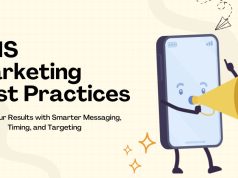You’ve probably received dozens of text messages from businesses this month alone. Maybe it was a flash sale from your favorite clothing brand, a reminder about an upcoming appointment, or a discount code that actually made you buy something you’d been considering.
SMS marketing has quietly become one of the most effective ways for businesses to reach their customers. With open rates consistently above 90% and response rates that make email marketers envious, text message marketing seems almost too good to be true. But before you jump on the SMS bandwagon, you’re probably wondering: are SMS marketing platforms actually worth the cost?
The short answer is yes, but with important caveats. SMS marketing platforms can deliver impressive returns on investment when used correctly, but they’re not a magic solution for every business. The key lies in understanding what these platforms offer, how much they cost, and whether they align with your specific marketing goals and customer base.
What SMS Marketing Platforms Actually Do
SMS marketing platforms serve as the bridge between your business and your customers’ phones. These tools handle everything from managing contact lists to scheduling campaigns and tracking performance metrics.
Most platforms offer core features like bulk messaging, automated workflows, and basic analytics. You can segment your audience based on purchase history, location, or engagement levels, then send targeted messages that feel personal rather than spammy. Advanced platforms include features like two-way messaging, integration with e-commerce platforms, and detailed reporting that shows exactly which messages drive sales.
The real value lies in automation capabilities. Instead of manually sending individual texts, you can set up triggered messages that respond to customer actions. When someone abandons their shopping cart, makes a purchase, or hasn’t visited your store in months, the platform can automatically send relevant messages at the perfect moment.

Breaking Down the Costs
SMS marketing platform pricing varies significantly based on the provider and your messaging volume. Most platforms use a tiered pricing model that includes both monthly platform fees and per-message charges.
Entry-level plans typically start around $20-30 per month for small businesses sending fewer than 1,000 messages monthly. Mid-tier plans range from $50-150 per month and usually include advanced features like automation workflows and detailed analytics. Enterprise solutions can cost several hundred dollars monthly but offer extensive customization and integration options.
Per-message costs generally range from $0.01 to $0.05 per text, depending on your volume and destination. Some platforms offer unlimited messaging within certain tiers, while others charge separately for each text sent.
Don’t forget about setup and compliance costs. You’ll need to invest time in building your subscriber list legally, creating compelling opt-in incentives, and ensuring your messages comply with regulations like TCPA and CAN-SPAM.
The ROI Reality Check
SMS marketing consistently delivers strong returns when executed properly. Industry studies show average ROI ranging from 1,300% to 2,000%, though your actual results will depend on factors like your industry, audience, and message quality.
The high open rates tell part of the story. While email open rates hover around 20-25%, SMS messages are opened by over 90% of recipients, usually within minutes of delivery. This immediate visibility translates to faster customer responses and quicker sales cycles.
Successful SMS campaigns often focus on time-sensitive offers, appointment reminders, and personalized recommendations. A restaurant might see significant revenue increases from lunch specials sent at 11 AM, while an e-commerce store could recover abandoned carts with targeted discount codes.
However, these impressive numbers come with an important caveat: SMS marketing works best as part of a broader marketing strategy, not as a standalone solution. The most successful businesses use text messages to complement their email, social media, and content marketing efforts.
Who Benefits Most from SMS Marketing
Certain business types see exceptional results from SMS marketing platforms. Retail businesses with frequent promotions, restaurants with daily specials, and service providers with appointment-based models often achieve the highest returns.
Local businesses particularly benefit from SMS marketing’s immediacy. A hair salon can fill last-minute cancellations, a gym can promote new classes, and a retail store can drive foot traffic during slow periods. The personal nature of text messaging creates stronger connections with local customer bases.
E-commerce businesses also see strong results, especially for cart abandonment recovery and post-purchase follow-ups. Time-sensitive industries like travel, events, and limited-inventory retailers can leverage SMS’s urgency to drive quick decisions.
Conversely, B2B companies with long sales cycles might find less value in SMS marketing. Professional services, high-ticket items, and complex products that require extensive research don’t always align with text messaging’s brief, immediate format.

Common Pitfalls That Waste Money
Many businesses fail to see good returns from SMS marketing because they treat it like email marketing with a character limit. Text messages require a different approach, and common mistakes can quickly erode your investment.
Over-messaging ranks as the top reason SMS campaigns fail. While email subscribers might tolerate daily messages, text message recipients expect restraint. Sending more than 2-4 messages per week often leads to high unsubscribe rates and spam complaints.
Generic, impersonal messages also underperform significantly. The intimate nature of text messaging means customers expect relevant, timely content. Blast messages that could apply to anyone rarely drive meaningful engagement or sales.
Poor timing can kill even well-crafted campaigns. Unlike email, which people check on their schedule, text messages interrupt whatever someone is doing. Sending promotional messages at 6 AM or 11 PM will annoy customers rather than convert them.
Finally, neglecting compliance requirements can result in expensive fines and legal troubles. SMS marketing has strict opt-in requirements, and cutting corners on consent can lead to penalties that far exceed any potential returns.
Making the Investment Decision
SMS marketing platforms are worth the investment for businesses that can commit to doing it right. This means having a clear strategy, respecting your audience, and maintaining realistic expectations about results.
Before investing, honestly assess whether you have compelling reasons for customers to give you their phone numbers. Can you offer genuine value through text messages? Do you have time-sensitive offers or information that benefits from immediate delivery? If your answers are vague or uncertain, you might want to focus on other marketing channels first.
Consider starting with a basic platform and simple campaigns to test your audience’s response. Many providers offer free trials or low-cost starter plans that let you experiment without major financial commitments. Track your results carefully and be prepared to adjust your approach based on what you learn.
Remember that SMS marketing success requires ongoing effort. You’ll need to regularly clean your subscriber list, create fresh content, and optimize your campaigns based on performance data. Factor these time investments into your cost calculations.

Your Next Steps
SMS marketing platforms can deliver exceptional returns for the right businesses, but success requires strategy, respect for your audience, and realistic expectations. The platforms themselves are tools—their value depends entirely on how you use them.
If you’re considering SMS marketing, start by defining clear goals and identifying how text messaging fits into your broader marketing strategy. Research platforms that align with your needs and budget, then begin with small-scale campaigns to test your approach.
Most importantly, remember that your customers’ phone numbers represent significant trust. Use that access wisely, and SMS marketing platforms can become one of your most valuable marketing investments. Abuse that trust, and you’ll quickly discover that unsubscribe buttons work very well in text messages too.









